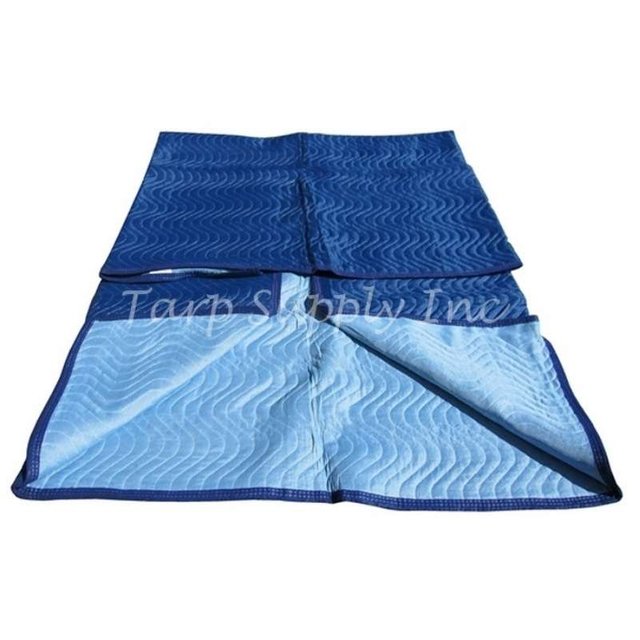Moving blankets are an excellent investment for protecting valuable items during moves, storage, and even various DIY projects. Known for their durability and sometimes reinforced with tarpaulin backing, moving blankets are designed to handle heavy-duty use. However, to get the most out of these protective layers, it’s important to clean and maintain them regularly. Proper care can extend the life of your moving blankets, ensuring they remain effective over time. In this guide, we’ll cover how to clean and maintain your moving blankets to maximize their longevity and keep them in optimal condition for future use.

1. Understanding Your Moving Blanket’s Material
Before you begin cleaning, it’s essential to understand the material of your moving blankets. Moving blankets come in a variety of fabrics, including cotton, polyester, and blends, often with a tarpaulin or water-resistant backing. Cotton blankets are softer and absorbent, making them ideal for delicate items, while polyester and tarpaulin-backed blankets offer more water resistance and durability.
Knowing the fabric type is crucial for choosing the right cleaning method. For instance, cotton blankets can usually handle machine washing, but those with tarpaulin or synthetic layers may require gentler care to prevent damage. By checking the manufacturer’s care instructions, you’ll avoid common cleaning mistakes that could wear out your blankets prematurely. Identifying the material will set you on the right path for effective cleaning and maintenance.
2. Removing Dirt and Debris Before Washing
Moving blankets often collect dust, dirt, and debris during use. Before washing, take a moment to shake out any loose particles. For larger debris or stubborn dirt, use a handheld vacuum or brush to clean the surface. This step is particularly important for tarpaulin-backed blankets, as dirt can settle into the fibers and make washing less effective.
If your moving blanket has been exposed to outdoor conditions or heavy dust, brushing or vacuuming it first will prevent clogs in your washing machine. This pre-cleaning step also minimizes the chances of lingering stains or odors that can set into the fabric. For items that can’t go in the washing machine, wiping down with a damp cloth or spot-cleaning is a great alternative. This process ensures a cleaner, more thorough wash and reduces the buildup of unwanted grime.
3. Washing Methods for Different Moving Blanket Types
For washable moving blankets, the washing machine can be a convenient option. Use cold water on a gentle cycle with mild detergent to avoid damage, especially for cotton or blended fabrics. If your blanket is tarpaulin-backed, avoid using high temperatures, as they could warp or crack the tarpaulin layer over time.
If your blankets are too large for a home washing machine, consider taking them to a laundromat with industrial machines. For spot-cleaning, mix a small amount of mild detergent with water and gently scrub the affected area with a sponge or cloth. Rinse thoroughly to remove any soap residue. For tarpaulin-backed blankets, avoid soaking as it can affect the waterproof layer. Instead, wipe down the surface with a damp cloth and mild cleaner. Regular washing and spot-cleaning will keep your moving blankets fresh, free of odors, and ready for use.
4. Drying Your Moving Blankets Properly
Proper drying is essential to avoid mildew or odor buildup in your moving blankets. After washing, avoid using high heat in the dryer, especially for tarpaulin-backed or polyester blankets. Instead, opt for a low or medium heat setting to prevent shrinkage and preserve fabric integrity. Cotton blankets can be air-dried in a well-ventilated area, and laying them flat helps avoid any fabric distortion.
If air-drying outdoors, choose a sunny day to take advantage of natural sunlight, which also helps to remove lingering odors. For tarpaulin-backed blankets, avoid direct sunlight, as it could cause the material to degrade over time. Drying racks or clotheslines are ideal for maintaining the shape of the blankets and ensuring an even dry. Avoid leaving them in damp areas, as moisture can invite mold growth and shorten the blanket’s lifespan. Drying your moving blankets thoroughly after each wash ensures they remain odor-free and ready for their next use.
5. Storage Tips to Extend the Life of Moving Blankets
Storing moving blankets correctly is crucial for their longevity. Once the blankets are clean and dry, fold them neatly to minimize creasing and store them in a cool, dry place away from direct sunlight. Avoid storing blankets in damp areas, as this could encourage mold and mildew. Plastic bins or storage bags work well for keeping blankets organized and protected from dust.
If you use moving blankets seasonally or intermittently, consider adding silica gel packets to storage containers to absorb moisture. For tarpaulin-backed blankets, ensure they’re stored in a flat position to prevent bending or cracking of the water-resistant layer. Labeling your storage bins can help you easily locate the blankets when needed, especially if you have different types or sizes. Proper storage practices will not only protect your moving blankets from unnecessary wear and tear but will also save you time when preparing for your next use.
Conclusion: Maximizing the Durability of Your Moving Blankets
Moving blankets are a versatile and durable tool for protecting belongings, whether during a move, in storage, or for various DIY projects. However, proper cleaning, drying, and storage are essential for maintaining their quality over time. By understanding the material of your blankets, removing dirt before washing, and choosing appropriate washing and drying methods, you can ensure your moving blankets stay in excellent condition.
Investing time in these maintenance practices can significantly extend the life of your moving blankets, making them a dependable resource for years to come. With regular care, your moving blankets will remain a valuable asset, providing effective protection for your items and offering peace of mind with every use.